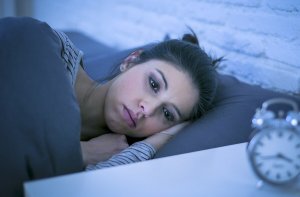5 Keys to Sleeping Well Before a Competition

On the night before a competition, nervousness, restlessness, and insecurities are all too common. Consequently, sleep disorders can result and later, could have a toll on athletic performance. We have five keys to share with you so that you can avoid these problems and sleep well before a competition.
Sleep and athletic performance
Properly going through your sleep cycles is fundamental for optimal athletic performance. The consequences of sleep deprivation, which we’ve all experienced at some point or another, are very uncomfortable. Irritation, tiredness and the lack of concentration are several of the most common ones.
If you exercise or play a sport, lack of sleep will often have a negative impact on athletic performance. Fatigue comes faster and it’s harder to stay concentrated on goals.
Recommendations for sleeping well before competing
1. The importance of having a routine
Routines are a huge help for maintaining a healthy sleep schedule. If you get used to eating, sleeping and exercising at the same hours every day, it’ll be harder for your body to change its sleep schedule. If you’re not good at following routines and having a fixed schedule, feel free to keep things a little flexible.

As your competition gets closer, stick to your routines more strictly, especially to your sleeping hours. Avoid long naps as they could keep you from getting tired at night. You can also use an alarm in the morning to control the number of hours you sleep.
2. Avoid heavy meals
Big meals are often the reason why we can’t fall asleep at night. In light of that, keep your dinners light. Here are some ideas for healthy dinners that’ll leave you satisfied without weighing you down.
In addition, try eating dinner at least two hours before going to bed. That way you’ll have already digested the meal by the time you go to bed and won’t feel bloated.
3. Distract yourself and forget about the competition
As competitions near, our thoughts start revolving around it. It’s completely normal because we spend so much time and effort to train for it.
Thinking about the competition means you’re motivated, and that’s great. But not being able to free your thoughts of it could end up causing insomnia.
Look for a distraction that can keep you busy for a few hours to forget about the competition. Going to the movies, taking a walk or meeting up with friends are all good options. It’ll help you release tension and feel more relaxed.
4. Try tea for a good night’s sleep
As we’ve mentioned in other posts, teas can be a great way to help our bodies rest. Try taking them just before sleeping. They’ll help you relax and fall asleep easier.
5. Relax techniques
Before a competition, it’s normal to feel tense. It’s a clear consequence of all the nerves.
Stomach problems are another symptom of nervousness along with trouble staying still and irritability. All of these symptoms usually lead to trouble falling asleep.

In response to these problems, you can try relaxation techniques. These exercises will help you relax your muscles and release tension.
Conclusion: a good night’s sleep is fundamental
Rest is essential for performing well at work, in studies or at any competition. Lacking sleep can harm our personal and professional life, making it very important to address insomnia issues. Use these keys and start sleeping well.
On the night before a competition, nervousness, restlessness, and insecurities are all too common. Consequently, sleep disorders can result and later, could have a toll on athletic performance. We have five keys to share with you so that you can avoid these problems and sleep well before a competition.
Sleep and athletic performance
Properly going through your sleep cycles is fundamental for optimal athletic performance. The consequences of sleep deprivation, which we’ve all experienced at some point or another, are very uncomfortable. Irritation, tiredness and the lack of concentration are several of the most common ones.
If you exercise or play a sport, lack of sleep will often have a negative impact on athletic performance. Fatigue comes faster and it’s harder to stay concentrated on goals.
Recommendations for sleeping well before competing
1. The importance of having a routine
Routines are a huge help for maintaining a healthy sleep schedule. If you get used to eating, sleeping and exercising at the same hours every day, it’ll be harder for your body to change its sleep schedule. If you’re not good at following routines and having a fixed schedule, feel free to keep things a little flexible.

As your competition gets closer, stick to your routines more strictly, especially to your sleeping hours. Avoid long naps as they could keep you from getting tired at night. You can also use an alarm in the morning to control the number of hours you sleep.
2. Avoid heavy meals
Big meals are often the reason why we can’t fall asleep at night. In light of that, keep your dinners light. Here are some ideas for healthy dinners that’ll leave you satisfied without weighing you down.
In addition, try eating dinner at least two hours before going to bed. That way you’ll have already digested the meal by the time you go to bed and won’t feel bloated.
3. Distract yourself and forget about the competition
As competitions near, our thoughts start revolving around it. It’s completely normal because we spend so much time and effort to train for it.
Thinking about the competition means you’re motivated, and that’s great. But not being able to free your thoughts of it could end up causing insomnia.
Look for a distraction that can keep you busy for a few hours to forget about the competition. Going to the movies, taking a walk or meeting up with friends are all good options. It’ll help you release tension and feel more relaxed.
4. Try tea for a good night’s sleep
As we’ve mentioned in other posts, teas can be a great way to help our bodies rest. Try taking them just before sleeping. They’ll help you relax and fall asleep easier.
5. Relax techniques
Before a competition, it’s normal to feel tense. It’s a clear consequence of all the nerves.
Stomach problems are another symptom of nervousness along with trouble staying still and irritability. All of these symptoms usually lead to trouble falling asleep.

In response to these problems, you can try relaxation techniques. These exercises will help you relax your muscles and release tension.
Conclusion: a good night’s sleep is fundamental
Rest is essential for performing well at work, in studies or at any competition. Lacking sleep can harm our personal and professional life, making it very important to address insomnia issues. Use these keys and start sleeping well.
All cited sources were thoroughly reviewed by our team to ensure their quality, reliability, currency, and validity. The bibliography of this article was considered reliable and of academic or scientific accuracy.
- Medic, G., Wille, M., & Hemels, M. E. (2017). Short-and long-term health consequences of sleep disruption. Nature and science of sleep, 9, 151.
- Montserrat Galaa, A. M., & Fortes del Valleb, M. A. (2013). Aprender a dormir. Pediatría de Atención Primaria.
- Vitale, K. C., Owens, R., Hopkins, S. R., & Malhotra, A. (2019). Sleep hygiene for optimizing recovery in athletes: review and recommendations. International journal of sports medicine, 40(08), 535-543.
- Watson, A. M. (2017). Sleep and athletic performance. Current sports medicine reports, 16(6), 413-418.
This text is provided for informational purposes only and does not replace consultation with a professional. If in doubt, consult your specialist.








